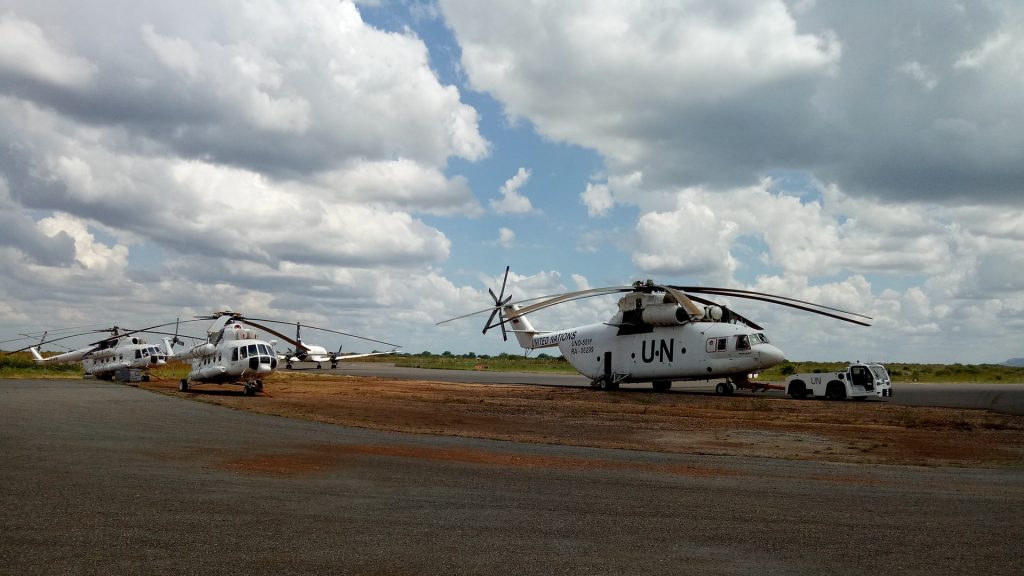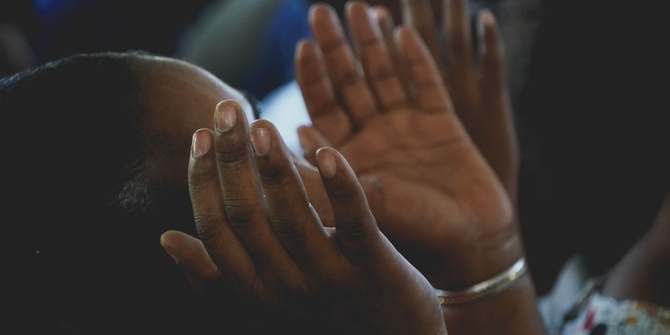National NGOs and faith-based organisations in South Sudan have existed throughout periods of civil war and peacetime, which have often been misunderstood by the international community. In this post, Dr Leben Moro of the University of Juba traces these organisations’ historic development and the factors that give rise to their shifting activities. This post was originally published on the Africa at LSE blog.

National NGOs (NNGOs) and faith-based organisations have long played significant roles in Southern/South Sudan, which have been involved in development efforts during times of peace as well as humanitarian action during times of civil strife. These roles extend from the time of the Operation Lifeline Sudan (OLS), a United Nations-led humanitarian programme that started in 1989 and ended in 2005, to the present moment.
However, these organisations’ roles have not followed a straight trajectory and have been less appreciated and understood by UN agencies and International NGOs (INNGOs). There are times when their activities appear to grow, and at other times their activities seem to decline. Being informed of the reasons for these changes is helpful for UN agencies and INNGOs which will be better placed to support NNGOs and faith-based organisations, in turn offering more services to their beneficiaries.
I contend the changes in the activities of NNGOs and faith-based organisations over time are due to three main factors, namely an evolving political landscape, the emergence or departure of a capable leader and shifting donor priorities. I critically examines these factors drawing on the findings of a 2019 study of NGOs in South Sudan commissioned by the UK’s Department for International Development.
Changing political landscape
The political situation of Southern Sudan, which became the Republic of South Sudan in 2011, has long been shifting dramatically, in turn influencing the operations of NGOs and faith-based organisations. From 1955 to 1972, the former Sudan was in civil war, which the Southern-based rebel movement, the Anyanya, waged against the government army. Christian churches and associated organisations supported some of the victims. This was not surprising as some of the key rebels were religious leaders, such as Father Santurino Lohure, the patron of the Anyanya.
After the war ended, NNGOs and faith-based organisations, including the Sudan Council of Churches, Sudan Relief & Development Agency (SUDRA), Caritas and African Committee for the Rehabilitation of South Sudan (ACROSS), collaborated with UN agencies and international non-governmental organisations to support relief and developmental operations. In fact, NGOs took over many development activities, such as educational and healthcare facilities, that the government should have been responsible for providing.
The period of relative peace ended in 1983, when the country relapsed into another round of war, which only ended in 2005 with the signing of the Comprehensive Peace Agreement between the Sudan People’s Liberation Movement/Army (SPLM/A) and the Sudanese government. The unprecedented scale of suffering during the war led to the birth of the OLS, which enabled millions of destitute Southern Sudanese to access humanitarian assistance.
The OLS era heralded the emergence of significant NNGOs, such as the New Sudanese Indigenous Network (NESI). However, the development of NNGOs slowed after the attainment of the Comprehensive Peace Agreement as some of the key leaders in those most successful organisations joined the newly formed government in Southern Sudan. The leader of NESI, for example, left the organisation and assumed a senior post in the Sudan People’s Liberation Movement party. Faith-based groups, however, continued with their activities with the support of churches and their foreign partners.
The independence of Southern Sudan also impacted NNGOs, the new country becoming embroiled in civil war barely two years later. The ongoing war, largely fought along ethnic lines, compelled a UN official to warn of violence escalating into genocide. Luckily, this feared calamity has not happened, but the consequences of the fighting are catastrophic with nearly 400,000 dead and another 4 million forced out of their home areas.
To alleviate the suffering, the international community poured billions of dollars’ worth of humanitarian assistance into the country, but largely ceased support for development activities. In general, the funds were controlled by UN agencies and INNGOs, which supported some NNGOs and faith-based organisations to implement activities that they were not able or willing to carry out themselves. In a way, this encouraged the growth or proliferation of NNGOs, and many of them failed to gain funding and remained dormant or collapsed. For example, the biggest growth of NNGOs, such as Theso, Heathlink and STO, occurred during the recent war years.
Emergence or departure of a capable leader
A capable leader can transform the fortunes of a NNGO. For example, NESI certainly prospered partly because its leader was capable, and it gradually collapsed after they left to join the government.
Among other talents, a capable leader communicates effectively with potential donors, spends any money received to achieve objectives and adequately accounts for fund use. Moreover, they have an eye for talent and hence build a capable team.
Some organisations struggle for years until a capable leader takes charge of its affairs. This is clearly illustrated by the story of Star Trust Organization (STO) in Western Equatoria. STO was operating at a small scale for several years. In the past two or so years, however, a capable young individual took charge and transformed it into a vibrant organisation. A senior government official described the capable young leader as follows:
“He has charisma … I know his father … In the 1980s, he was posted to Source Soebu, when it had the biggest hospital. That is the son of that doctor. That is why he is clever as his father. He is young but has capacity.” (Interview with a senior government official in Yambio on 16 August 2019.)
Shifting donor priorities
The decisions and actions that donors adopt from time to time have repercussions for NGOs and faith-based organisations, especially national ones. When their ties with the government are cooperative, donors often direct their support to government organisations, or at least have no concern about their support reaching or benefiting the government. However, when ties with the government deteriorate, donors tend to avoid the government and instead work with UN agencies, NGOs and faith-based groups to assist communities.
After the upsurge of violence in December 2013, many donors have been disappointed in the top elites who run the national government and have instead provided resources to UN agencies, NGOs and faith-based organisations so as to assist ordinary people, especially victims of the violence. In reaction, the government adopted an NGO law on 11 February 2016 and other measures to control activities of NGOs and faith-based organisations. NGOs have complained that the NGO law is overly restrictive and hence has negatively affected their efforts to support those in need.
The shift by donors enhanced the growth of NNGOs as opportunities for securing resources increased. In part, this is the reason for the growth of a small number of successful NNGOs. No doubt, without resources it is not possible to build significant organisations. Funding enables organisations to recruit and retain capable staff, acquire essential assets, and communicate effectively with donors and others.
NNGOs and faith-based groups have played a significant role in the historical development of Southern/South Sudan since the OLS time. However, their role has been shaped by various factors, in particular the changing political situation in the region, the capability of leaders and the actions and decisions of donors. Understanding these will allow UN agencies and INNGOs to better address the needs of NNGOs and faith-based organisations that have been playing significant development and humanitarian roles in the new country.
Note: This piece gives the views of the author, and not the position of the LSE Religion and Global Society blog, nor of the London School of Economics. It was originally published on the Africa at LSE Blog and is based on research from the project Historical and Political Dynamics of the NGO Sector in South Sudan based at the LSE Firoz Lalji Centre for Africa.





